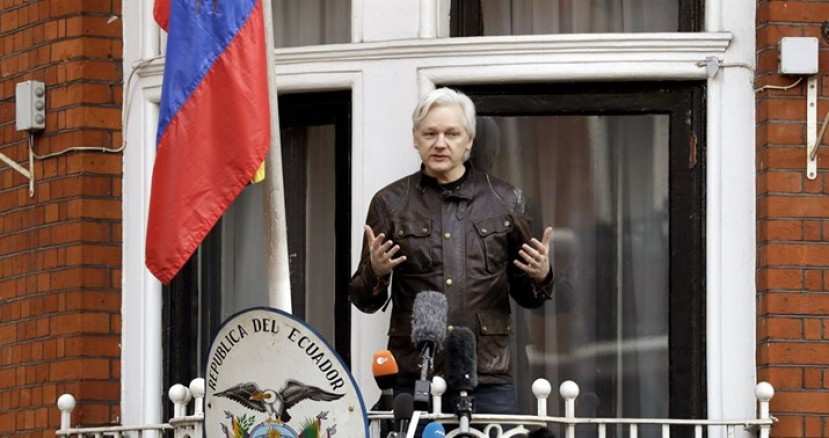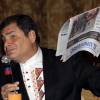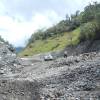Caso Chevron
Ecuador Spent How Much On Covert Ops To Protect Assange?
Ecuadorian courts tried defrauding Chevron out of $18 billion a few years ago, only to have it blow up in their faces. They got lots of help from Hollywood celebrities, who worked with New York attorney Steve Donziger to support the lawsuit, which was later exposed as a grotesque fraud.
Hot Air 17/05/2018

Photo: Hot Air
Ever since Julian Assange took refuge in the Ecuadorian embassy in London to avoid arrest on a warrant from Sweden, protestors have held regular demonstrations to “FREE ASSANGE!” It turns out that Assange is far from free, according to documents obtained by The Guardian. Ecuador has spent more than five million dollars not just on security for Assange, but also for “covert” operations and intelligence gathering during his stay.
Remind me again of what Wikileaks does:
Ecuador bankrolled a multimillion-dollar spy operation to protect and support Julian Assange in its central London embassy, employing an international security company and undercover agents to monitor his visitors, embassy staff and even the British police, according to documents seen by the Guardian.
Over more than five years, Ecuador put at least $5m (£3.7m) into a secret intelligence budget that protected the WikiLeaks founder while he had visits from Nigel Farage, members of European nationalist groups and individuals linked to the Kremlin. …
Documents show the intelligence programme, called “Operation Guest”, which later became known as “Operation Hotel” – coupled with parallel covert actions – ran up an average cost of at least $66,000 a month for security, intelligence gathering and counter-intelligence to “protect” one of the world’s most high-profile fugitives.
An investigation by the Guardian and Focus Ecuador reveals the operation had the approval of the then Ecuadorian president, Rafael Correa, and the then foreign minister, Ricardo Patiño, according to sources.
That seems a bit off-mission for Wikileaks’ founder, whose main effort has been to expose the intelligence operations of the US and other Western nations. Wikileaks has had little hesitation in sharing highly sensitive information over the objections of officials who argue that its exposure endangers their citizens. Oddly, they don’t seem to apply the same standard when it comes to the protection of their own people. Go figure.
Mostly, though, this reflects much more poorly on Ecuador than on Assange, whose instinct for self-preservation is understandable even if unlaudable. The money went beyond security and even intelligence to public relations. Ecuador spent nearly $200,000 in 2014 alone for media consultants to improve Assange’s image, including the publication of an opinion piece in the Guardian itself, the paper notes.
And what did Ecuador get for its investment in Assange? He hacked their comms in order to get an unfettered access to the Internet, according to the documentation reviewed by the Guardian. Their video surveillance contractors warned Ecuador that Assange was gathering intelligence on Ecuador’s operations out of the embassy too, although Assange does not seem to have bitten the hand that hides him — yet, anyway. Perhaps Assange felt the need for a little insurance, so to speak.
So far, Ecuador hasn’t forced Assange out, so the relationship still seems to be working. What Ecuador gets out of this circus is still difficult to determine, but perhaps they’re concerned about what would get out if they ever give Assange the boot. Maybe it’s better for Ecuador to keep Assange in their own grip at this point.
It’s hardly the first time Ecuador’s been embarrassed on the world stage, of course. Their courts tried defrauding Chevron out of $18 billion a few years ago, only to have it blow up in their faces, not terribly unlike how their Assange asylum has worked out. They got lots of help from Hollywood celebrities, who worked with New York attorney Steve Donziger to support the lawsuit, which was later exposed as a grotesque fraud. Donziger kept a diary, which ended up as evidence in US court proceedings, and the revelations from it are … well, delicious, as Phelim McAleer describes:
My new play exposes how environmentalists carried out the world’s biggest fraud, how the media helped promote the fraud, and how they almost got away with it.
The play, called The $18-Billion Prize, will open at the Phoenix Theater in San Francisco on May 19th and run until June 3rd.
I co-wrote it with Jonathan Leaf and it tells the story of a lawsuit, led by New York lawyer Steven Donziger, against the Chevron oil company. The lawsuit alleged Chevron destroyed the rainforest in Ecuador and poisoned the natives. It was successful, and an Ecuadorian court awarded the plaintiffs a staggering $18 billion. Yes, BILLION. This was the biggest ever award in a civil court, but it was ALSO the biggest fraud in history.
Haven’t heard about it?? Funny. The same media that reported endlessly on the so-called “pollution” went pretty quiet when the case turned out to be a fraud. And a load of Hollywood celebrities who helped promote the fraud have also gone very quiet recently. Yes I’m talking about you Sting, Mia Farrow and Danny Glover.
The play shows how the plaintiffs, led by Donziger, bribed the judge and ghost wrote the judgment that awarded them this massive amount. And they were helped on their fraud by a cheerleading media that reported the allegations as fact but have been silent as the truth was revealed.
The scope of the fraud was enormous and at times farcical. Along with bribing judges, they used ludicrous code words to describe the top secret payments. It was all revealed when a New York court, realizing that something was amiss, ordered Donziger to hand over his files. In those files and diaries, Donziger admitted illegal bribes to judges and court officials as he wondered if he had “done a deal with the devil.”
The play reveals all the incredible details, and we have an amazing cast with Richard Kuhlman directing. He loves the play and has already made some stunning changes and suggestions. It is hilarious in places, revealing the madness and hypocrisy of the celebrities who went to Ecuador to “support the natives.” It turns some of them were secretly paid an absolute fortune, and you will laugh and cry when you see how they behaved when they thought the cameras were switched off. They also didn’t know it was all recorded in his files by Steven Donziger.
Phelim’s still raising money for the effort on IndieGoGo, the crowdfunding site by which he successfully financed the upcoming Gosnell Movie and his first play, Ferguson. If you’re interested in helping to expose the Ecuadorian fraud on Chevron, be sure to kick in what you can — and if you’ll be in San Francisco during that period, get your tickets now at Phelim’s website.
Fuente OriginalNotas relacionadas
-
 Ecuador tiene la primera Área Protegida Comunitaria
Ecuador tiene la primera Área Protegida Comunitaria -
 Liberan a oso perezoso en el bosque protector de Napo
Liberan a oso perezoso en el bosque protector de Napo -
 Periodista procesado por injuriar al presidente ecuatoriano huye a la selva del Amazonas
Periodista procesado por injuriar al presidente ecuatoriano huye a la selva del Amazonas -
 Impacto del Fenómeno de El Niño en los deslizamientos de tierra en Ecuador
Impacto del Fenómeno de El Niño en los deslizamientos de tierra en Ecuador -
 La Cueva del Salto de Oro, patrimonio geológico de Ecuador
La Cueva del Salto de Oro, patrimonio geológico de Ecuador -
 Vega: La eliminación de subsidios está muy cerca
Vega: La eliminación de subsidios está muy cerca
